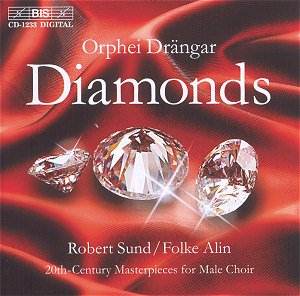Despite the very un-BIS like tacky cover and
almost equally tacky quote on the reverse, this disc is well up
to usual label standards. The vast majority of the pieces in this
very varied but expertly arranged recital do indeed justify their
billing as masterpieces.
The Orphei Drängar is a Swedish male choir
of some renown. It was founded in 1853 and was directed by Hugo
Alfvén for 37 years in the early twentieth century. The
performances here, ranging from readings of Swedenís native music
to that of Japan and Slovakia and from as early as 1914 to as
recently as 2000, are superlative, as are the very detailed booklet
notes.
The CD is introduced by Poulenc's short but immortal
Quatre petites prières. In this and the other French
pieces on the disc, the choir acquits itself admirably. The third
and fourth of the prayers are particularly moving in this performance,
revealing the true simplicity and beauty of these settings. Milhaud's
Psaume 121 is a much denser, more hieratic piece, making
the composer's Jewish roots explicit but also working very well
in this context. Even the third French work, by the often lightweight
Saint-Saëns, has a certain power and depth to it. It didn't
surprise me to read that it was written contemporaneously with
the Organ Symphony.
The Scandinavian and Baltic are also, unsurprisingly,
much in evidence. The mastery of Veljo Tormis is well represented
in the runic Songs of the Ancient Sea - if you have ever
revelled, like myself, in the dark sonorities and granitic basses
of Sibelius' choral pieces, including Kullervo and The
Origin of Fire, then you will love this. Every new piece I
hear by this composer impresses and, in a fair world, he ought
to be as well-known and popular as his countryman Arvo Pärt.
Late-Romantic melancholia comes in the form of Evening Clouds
by the short-lived Finn Toivo Kuula and in the Strauss setting
of Rückert's Traumlicht. Randall Thompson, on the
other hand, an American composer whose work has been unjustly
neglected, save for the classic Bernstein account of his Second
Symphony, is represented by a rollicking setting of Belloc
in Tarantella. It comes across almost like superior show
music, as accessible and tuneful as the finale of the aforementioned
symphony. Apparently, at some point, Naxos are supposed to be
issuing a disc of Thompson's choral works. If the rest are even
half as good as this then we should be in for a treat.
Returning to Nordic music, the two most recent
and in some ways most challenging pieces here are by Swedish composers
Daniel Börtz and Anders Hillborg. The former's Dawn Wind
is a complex sounding piece, made more so by being placed between
the much more direct utterances of Milhaud and Tormis - one of
few, perhaps the only sequencing error here. Listened to in isolation,
Börtz's piece is a little more accessible but still less
immediate than much of the programme. Hillborg is completely different,
providing a hypnotic, phonetics-based minimalist soundscape, cohabited
by early John Adams and Asian chanting - Tibet? Mongolia?
An absolute classic of the genre anyway and as great a way to
close the CD as the Poulenc was to open it. Between Thompson and
Hillborg we are also treated to folk-based pieces by Japan's Michio
Mamiya, Eugen Suchoň and Jaroslav Křička, both
from the former Czechoslovakia.
The Slovak Suchoň gets my vote with his rougher, more angular
writing although there is much charm in the more diffuse, relaxing
music of the Czech Křička. Incidentally, like Thompson,
Suchoň was previously represented by just a single
work in my collection. On the evidence of that excellent String
Serenade (on the defunct Czech Opus label) and this choral
work, he is another who deserves and awaits greater attention.
All in all, this is a disc that almost totally
achieves what it sets out to do and is one which will definitely
repay repeated listening. At least four of the pieces included
- those by Tormis, Thompson, Poulenc and Hillborg - in their quite
different ways, scale the very highest heights of artistic achievement.
Some of the others are not so far behind. BIS remains a label
with true vision. Discs like this one and the various series devoted
to Skalkottas, Leifs etc. are invaluable and pretty much indispensable.
Great stuff!
Neil Horner

